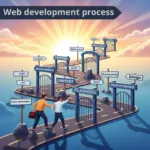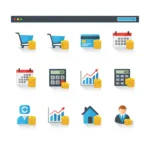- 1. Define your project requirements
- 2. Research a potential web developer long list
- 3. Check portfolios and testimonials for each web developer
- 4. Ask the right questions
- 5. Understand the development process
- 6. Consider communication and support
- 7. Review proposals and contracts
- 8. Further reading on finding a web developer
Finding the perfect web developer in the UK can feel like a huge task. Indeed, it’s a critical decision for any business, large or small. Therefore, this article will guide you through the process, helping you find a web developer who fits your needs. We will cover key factors to consider, essential questions to ask, and common pitfalls to avoid.
Define your project requirements
Before you start looking for a web developer in the UK, you need to clearly define what you want. What is the purpose of your website? Is it an e-commerce store, a brochure site, a sophisticated web application, or something else entirely? Consider the specific features you need. Do you need to take payments online, a content management system, a contact form, or a blog? Thinking about user experience is also vital. How do you want your visitors to interact with your site?
Furthermore, establishing a realistic budget is crucial; it will significantly help in narrowing down your options and managing expectations. Knowing your precise goals helps a web developer understand your vision and propose suitable solutions. Moreover, this clarity saves both time and money in the long run by preventing scope creep and costly revisions. Providing examples of websites you like and dislike is also helpful. A web developer can use this to grasp your style and preferences. Conversely, don’t limit the design ideas for your own site by supposing it will look just like your samples.
If you need help with this before hiring a website developer, we’ve developed a guide to perfect website planning. This is designed to help you define your project requirements.
Alternatively, you can hire a consultant to help you create a definition and support you through your web development project.
Research a potential web developer long list
Once you have a clear idea of your project, it’s time to research potential web developers. You will need to create a long list of up to five candidates. Look for developers who specialise in your industry or the specific type of website you need. For instance, if you need an e-commerce site seek a web developer with experience in Shopify or WooCommerce. Online searches are a good starting point, using terms such as “hire web developer UK” or “best web developer Gloucestershire.” You can also ask for recommendations from trusted business contacts, industry peers, or even local chambers of commerce.
Websites like Clutch, Upwork, Google, and LinkedIn are useful resources to find a web developer. Some tools allow you to filter by location, specialism, and reviews. Pay close attention to reviews and ratings; they offer invaluable insights into a developer’s professionalism, reliability, and technical skill. When you find a web developer, ensure they are based in the UK. This aids communication, ensures they understand of the local market, and can potentially meet face-to-face, if necessary. Consider also looking at their online presence —does their own website reflect the quality of work you expect?
Check portfolios and testimonials for each web developer
A web developer’s portfolio is a powerful window into their past work and capabilities. Take ample time to review their past projects critically. Do they align with your aesthetic preferences and functional requirements? Look for a diverse range of projects, but also consistency in the quality and attention to detail. Pay attention to the responsiveness of their sites, the intuitiveness of the user interfaces, and the overall design quality.
Furthermore, client testimonials are an invaluable resource. They provide real-world feedback on a web developer’s professionalism, communication style, ability to meet deadlines, and overall project delivery. Don’t hesitate to ask for direct references if they aren’t readily available on their website or profiles. Speaking to previous clients can give you an idea of what it’s like to work with that web developer. This is crucial when you want to hire a web developer who will be a true partner in your project. A strong portfolio and positive testimonials are often strong indicators of a reliable and skilled web developer.
Ask the right questions
When you meet with potential web developers, come prepared with a comprehensive list of questions. Asking thoughtful questions demonstrates your seriousness and helps you gauge their expertise and suitability. For instance, ask about their experience with projects similar to yours, and how they handle challenges or unexpected issues. Enquire about their understanding of search engine optimisation (SEO) best practices and how they integrate this into their development process. Ask about mobile responsiveness and ensuring your site performs well across all devices.
Furthermore, delve into their post-launch support and maintenance plans. Will they offer ongoing technical support, security updates, and performance monitoring? What are their typical turnaround times for bug fixes or minor updates? A good web developer will be transparent, willing to answer all your questions, and happy to discuss their process. Proactive questioning helps you find a web developer who is not only technically skilled but also a good communicator and a reliable long-term partner.
Understand the development process
Every web developer has their own way of working, and it’s important that you fully understand their development process. Do they use agile methods, involving iterative cycles and regular feedback, or a traditional waterfall approach with distinct, sequential phases? How frequently will you receive updates on the project’s progress, and through what channels? Will there be specific milestones set, with clear deliverables and review points (‘gates’)?
A clear and well-defined process ensures that both parties are on the same page from start to finish. This helps to prevent misunderstandings and keeps the project on track. Also, be honest about your availability during the project. If the web developer is waiting for feedback or content from you it’ll have a major impact on project delivery. Discuss how they handle changes and revisions during the project, and what impact they have on the timeline and budget. Understanding their quality assurance (QA) procedures, including testing and debugging, is also vital. So, finding a web developer who has a transparent and well-structured process is a key indicator of their professionalism and ability to deliver a successful outcome. This also builds trust and confidence in their capabilities.
Consider communication and support
Effective communication is absolutely vital for a successful web development project. How responsive is the web developer to your enquiries and feedback? Do they communicate clearly, concisely, and in a way that is easy for you to understand? Do they help you to understand technical matters and help you feel comfortable, even if you’re not very technical? Discuss their preferred communication channels, whether it’s email, phone calls, video conferences, or a dedicated project management platform. Regular updates and scheduled meetings can ensure consistent progress.
Also, consider the nature of their ongoing support. What happens after the website is officially launched? Will they provide comprehensive maintenance packages, including regular backups, software updates, and security patches? What is their policy on troubleshooting issues or providing assistance if you encounter problems with your website? Good post-launch support ensures your website remains functional, secure, and performs optimally in the long term. A web developer who offers robust communication and reliable support demonstrates a commitment to your long-term success.
Review proposals and contracts
Once you have narrowed down your choices to a few potential web developers, you will receive detailed proposals. Carefully review each proposal with a critical eye. Do they clearly and comprehensively outline the scope of work, including all features and functionalities? Is the proposed timeline realistic, and are the costs transparent, with no hidden fees or vague terms? Pay attention to the breakdown of costs, understanding what each component covers.
The contract is a legally binding document that should protect both parties. It should clearly cover intellectual property rights, specifying who owns the code and design elements upon completion. Payment schedules should be explicitly stated, detailing deposit requirements, milestone payments, and final payment terms. Furthermore, it should include clauses for dispute resolution and termination if necessary. If anything in the proposal or contract is unclear, do not hesitate to ask for clarification. Seek legal advice if you feel it’s necessary, but make sure you are completely comfortable and confident in the agreement. Taking your time here ensures you hire web developer services that are reliable and align with your business objectives.
Find the perfect web developer for your project. Get a free quote from Redcentaur.
Choosing the right web developer in the UK requires careful consideration, thorough research, and due diligence. You can make an informed decision by:
- defining your needs,
- researching potential candidates,
- asking the right questions, and
- understanding their development process.
Remember, a good web developer is not just a ‘service provider’. They are an investment in your business’s future and a crucial partner in establishing a strong and effective online presence. In today’s digital age, a robust online presence is more important than ever.





